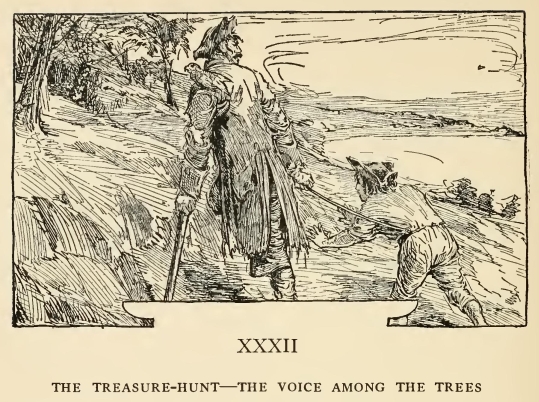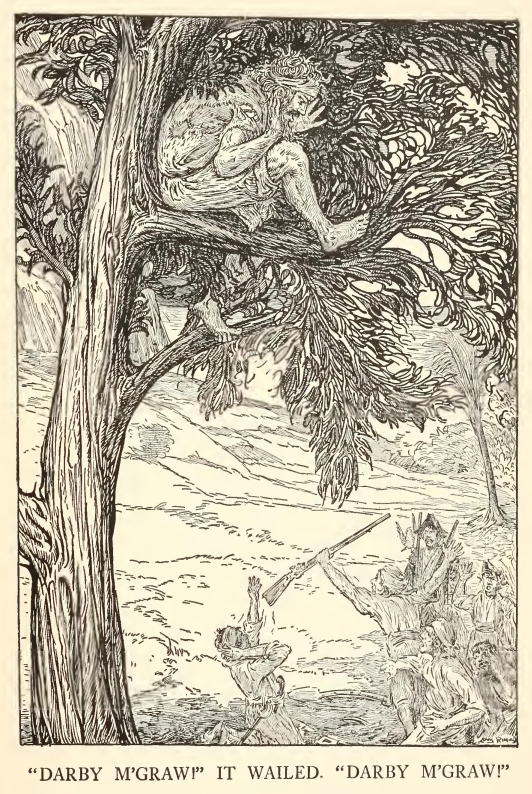32 The Treasure-hunt—The Voice Among the Trees

PARTLY from the damping influence of this alarm, partly to rest Silver and the sick folk, the whole party sat down as soon as they had gained the brow of the ascent.
The plateau being somewhat tilted towards the west, this spot on which we had paused commanded a wide prospect on either hand. Before us, over the tree-tops, we beheld the Cape of the Woods fringed with surf; behind, we not only looked down upon the anchorage and Skeleton Island, but saw—clear across the spit and the eastern lowlands—a great field of open sea upon the east. Sheer above us rose the Spyglass, here dotted with single pines, there black with precipices. There was no sound but that of the distant breakers, mounting from all round, and the chirp of countless insects in the brush. Not a man, not a sail, upon the sea; the very largeness of the view increased the sense of solitude.
Silver, as he sat, took certain bearings with his compass.
“There are three 'tall trees'” said he, “about in the right line from Skeleton Island. 'Spy-glass shoulder,' I take it, means that lower p'int there. It's child's play to find the stuff now. I've half a mind to dine first.”
“I don't feel sharp,” growled Morgan. “Thinkin' o' Flint—I think it were—as done me.”
“Ah, well, my son, you praise your stars he's dead,” said Silver.
“He were an ugly devil,” cried a third pirate with a shudder; “that blue in the face too!”
“That was how the rum took him,” added Merry. “Blue! Well, I reckon he was blue. That's a true word.”
Ever since they had found the skeleton and got upon this train of thought, they had spoken lower and lower, and they had almost got to whispering by now, so that the sound of their talk hardly interrupted the silence of the wood. All of a sudden, out of the middle of the trees in front of us, a thin, high, trembling voice struck up the well-known air and words: “Fifteen men on the dead man's chest—
Yo-ho-ho, and a bottle of rum!”
I never have seen men more dreadfully affected than the pirates. The colour went from their six faces like enchantment; some leaped to their feet, some clawed hold of others; Morgan grovelled on the ground.
“It's Flint, by ——!” cried Merry.
The song had stopped as suddenly as it began—broken off, you would have said, in the middle of a note, as though someone had laid his hand upon the singer's mouth. Coming through the clear, sunny atmosphere among the green tree-tops, I thought it had sounded airily and sweetly; and the effect on my companions was the stranger.
“Come,” said Silver, struggling with his ashen lips to get the word out; “this won't do. Stand by to go about. This is a rum start, and I can't name the voice, but it's someone skylarking—someone that's flesh and blood, and you may lay to that.”
His courage had come back as he spoke, and some of the colour to his face along with it. Already the others had begun to lend an ear to this encouragement and were coming a little to themselves, when the same voice broke out again—not this time singing, but in a faint distant hail that echoed yet fainter among the clefts of the Spy-glass.
“Darby M'Graw,” it wailed—for that is the word that best describes the sound—“Darby M'Graw! Darby M'Graw!” again and again and again; and then rising a little higher, and with an oath that I leave out: “Fetch aft the rum, Darby!”

The buccaneers remained rooted to the ground, their eyes starting from their heads. Long after the voice had died away they still stared in silence, dreadfully, before them.
“That fixes it!” gasped one. “Let's go.”
“They was his last words,” moaned Morgan, “his last words above board.”
Dick had his Bible out and was praying volubly. He had been well brought up, had Dick, before he came to sea and fell among bad companions.
Still Silver was unconquered. I could hear his teeth rattle in his head, but he had not yet surrendered.
“Nobody in this here island ever heard of Darby,” he muttered; “not one but us that's here.” And then, making a great effort: “Shipmates,” he cried, “I'm here to get that stuff, and I'll not be beat by man or devil. I never was feared of Flint in his life, and, by the powers, I'll face him dead. There's seven hundred thousand pound not a quarter of a mile from here. When did ever a gentleman o' fortune show his stern to that much dollars for a boozy old seaman with a blue mug—and him dead too?”
But there was no sign of reawakening courage in his followers, rather, indeed, of growing terror at the irreverence of his words.
“Belay there, John!” said Merry. “Don't you cross a sperrit.”
And the rest were all too terrified to reply. They would have run away severally had they dared; but fear kept them together, and kept them close by John, as if his daring helped them. He, on his part, had pretty well fought his weakness down.
“Sperrit? Well, maybe,” he said. “But there's one thing not clear to me. There was an echo. Now, no man ever seen a sperrit with a shadow; well then, what's he doing with an echo to him, I should like to know? That ain't in natur', surely?”
This argument seemed weak enough to me. But you can never tell what will affect the superstitious, and to my wonder, George Merry was greatly relieved.
“Well, that's so,” he said. “You've a head upon your shoulders, John, and no mistake. 'Bout ship, mates! This here crew is on a wrong tack, I do believe. And come to think on it, it was like Flint's voice, I grant you, but not just so clear-away like it, after all. It was liker somebody else's voice now—it was liker—”
“By the powers, Ben Gunn!” roared Silver.
“Aye, and so it were,” cried Morgan, springing on his knees. “Ben Gunn it were!”
“It don't make much odds, do it, now?” asked Dick. “Ben Gunn's not here in the body any more'n Flint.”
But the older hands greeted this remark with scorn.
“Why, nobody minds Ben Gunn,” cried Merry; “dead or alive, nobody minds him.”
It was extraordinary how their spirits had returned and how the natural colour had revived in their faces. Soon they were chatting together, with intervals of listening; and not long after, hearing no further sound, they shouldered the tools and set forth again, Merry walking first with Silver's compass to keep them on the right line with Skeleton Island. He had said the truth: dead or alive, nobody minded Ben Gunn.
Dick alone still held his Bible, and looked around him as he went, with fearful glances; but he found no sympathy, and Silver even joked him on his precautions.
“I told you,” said he—“I told you you had sp'iled your Bible. If it ain't no good to swear by, what do you suppose a sperrit would give for it? Not that!” and he snapped his big fingers, halting a moment on his crutch.
But Dick was not to be comforted; indeed, it was soon plain to me that the lad was falling sick; hastened by heat, exhaustion, and the shock of his alarm, the fever, predicted by Dr. Livesey, was evidently growing swiftly higher.
It was fine open walking here, upon the summit; our way lay a little downhill, for, as I have said, the plateau tilted towards the west. The pines, great and small, grew wide apart; and even between the clumps of nutmeg and azalea, wide open spaces baked in the hot sunshine. Striking, as we did, pretty near north-west across the island, we drew, on the one hand, ever nearer under the shoulders of the Spy-glass, and on the other, looked ever wider over that western bay where I had once tossed and trembled in the coracle.
The first of the tall trees was reached, and by the bearings proved the wrong one. So with the second. The third rose nearly two hundred feet into the air above a clump of underwood—a giant of a vegetable, with a red column as big as a cottage, and a wide shadow around in which a company could have manoeuvred. It was conspicuous far to sea both on the east and west and might have been entered as a sailing mark upon the chart.
But it was not its size that now impressed my companions; it was the knowledge that seven hundred thousand pounds in gold lay somewhere buried below its spreading shadow. The thought of the money, as they drew nearer, swallowed up their previous terrors. Their eyes burned in their heads; their feet grew speedier and lighter; their whole soul was bound up in that fortune, that whole lifetime of extravagance and pleasure, that lay waiting there for each of them.
Silver hobbled, grunting, on his crutch; his nostrils stood out and quivered; he cursed like a madman when the flies settled on his hot and shiny countenance; he plucked furiously at the line that held me to him and from time to time turned his eyes upon me with a deadly look. Certainly he took no pains to hide his thoughts, and certainly I read them like print. In the immediate nearness of the gold, all else had been forgotten: his promise and the doctor's warning were both things of the past, and I could not doubt that he hoped to seize upon the treasure, find and board the Hispaniola under cover of night, cut every honest throat about that island, and sail away as he had at first intended, laden with crimes and riches.
Shaken as I was with these alarms, it was hard for me to keep up with the rapid pace of the treasure-hunters. Now and again I stumbled, and it was then that Silver plucked so roughly at the rope and launched at me his murderous glances. Dick, who had dropped behind us and now brought up the rear, was babbling to himself both prayers and curses as his fever kept rising. This also added to my wretchedness, and to crown all, I was haunted by the thought of the tragedy that had once been acted on that plateau, when that ungodly buccaneer with the blue face—he who died at Savannah, singing and shouting for drink—had there, with his own hand, cut down his six accomplices. This grove that was now so peaceful must then have rung with cries, I thought; and even with the thought I could believe I heard it ringing still.
We were now at the margin of the thicket.
“Huzza, mates, all together!” shouted Merry; and the foremost broke into a run.
And suddenly, not ten yards further, we beheld them stop. A low cry arose. Silver doubled his pace, digging away with the foot of his crutch like one possessed; and next moment he and I had come also to a dead halt.
Before us was a great excavation, not very recent, for the sides had fallen in and grass had sprouted on the bottom. In this were the shaft of a pick broken in two and the boards of several packing-cases strewn around. On one of these boards I saw, branded with a hot iron, the name Walrus—the name of Flint's ship.
All was clear to probation. The cache had been found and rifled; the seven hundred thousand pounds were gone!
